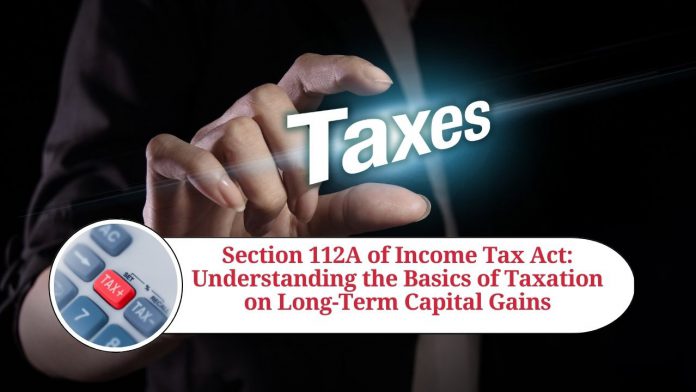Understanding Section 112A of Income Tax Act
Section 112A of the Income Tax Act was introduced in 2018, and it deals with the taxation of long-term capital gains (LTCG) arising from the transfer of equity shares, units of an equity-oriented fund, and units of a business trust. This section is a significant amendment to the Income Tax Act, and it has significant implications for investors and taxpayers. In this blog, we will explore the provisions of Section 112A and its impact on taxpayers.
What is Section 112A?
Section 112A of the Income Tax Act, 1961, is a provision that governs the taxation of long-term capital gains arising from the transfer of equity shares, units of an equity-oriented fund, and units of a business trust. According to this section, if the long-term capital gains arising from the transfer of these assets exceed Rs. 1 lakh in a financial year, then tax is levied at the rate of 10% on the amount exceeding Rs. 1 lakh. The provision applies to transfers made on or after April 1, 2018.
Implications for Taxpayers
The introduction of Section 112A has significant implications for taxpayers, particularly for those who invest in the stock market. Prior to the introduction of this section, long-term capital gains arising from the transfer of equity shares were exempt from tax. However, with the introduction of this section, a tax of 10% is levied on long-term capital gains exceeding Rs. 1 lakh.
The provision also affects the calculation of the cost of acquisition of equity shares or units. As per Section 112A, the cost of acquisition is taken as the higher of the actual cost of acquisition or the fair market value of the asset as on January 31, 2018. This means that if the actual cost of acquisition is lower than the fair market value as on January 31, 2018, then the higher value will be considered as the cost of acquisition for the purpose of computing capital gains.
Exemptions and Deductions
Section 112A also provides for certain exemptions and deductions. For example, the provision allows taxpayers to claim exemptions under Sections 54, 54B, 54EC, 54F, and 54GB of the Income Tax Act. These sections deal with exemptions available on the sale of a residential property, land used for agricultural purposes, and investments in specified bonds or funds.
Taxpayers can also claim deductions under Section 80C, 80CCC, 80CCD, 80D, 80DD, 80DDB, 80E, 80G, and 80TTA of the Income Tax Act. These sections provide for deductions on investments in certain schemes, contributions to pension plans, medical expenses, donations to charitable institutions, and interest earned on savings accounts.
Conclusion
Section 112A of the Income Tax Act is a significant amendment that has implications for taxpayers who invest in the stock market. The provision has made long-term capital gains arising from the transfer of equity shares, units of an equity-oriented fund, and units of a business trust taxable at the rate of 10% if the gains exceed Rs. 1 lakh in a financial year. The provision also affects the calculation of the cost of acquisition and provides for certain exemptions and deductions. Taxpayers must be aware of these provisions and plan their investments and tax liabilities accordingly.
Other Related Blogs: Section 144B Income Tax Act
Frequently Asked Questions (FAQs)
Q: What is Section 112A of the Income Tax Act?
A: Section 112A is a provision of the Income Tax Act that governs the taxation of long-term capital gains arising from the transfer of equity shares, units of an equity-oriented fund, and units of a business trust.
Q: When was Section 112A introduced?
A: Section 112A was introduced on April 1, 2018.
Q: How does Section 112A affect taxpayers?
A: Section 112A has significant implications for taxpayers who invest in the stock market. It makes long-term capital gains arising from the transfer of equity shares, units of an equity-oriented fund, and units of a business trust taxable at the rate of 10% if the gains exceed Rs. 1 lakh in a financial year.
Q: What is the cost of acquisition under Section 112A?
A: The cost of acquisition under Section 112A is the higher of the actual cost of acquisition or the fair market value of the asset as on January 31, 2018.
Q: Can taxpayers claim any exemptions or deductions under Section 112A?
A: Yes, taxpayers can claim exemptions under Sections 54, 54B, 54EC, 54F, and 54GB of the Income Tax Act. These sections deal with exemptions available on the sale of a residential property, land used for agricultural purposes, and investments in specified bonds or funds. Taxpayers can also claim deductions under Section 80C, 80CCC, 80CCD, 80D, 80DD, 80DDB, 80E, 80G, and 80TTA of the Income Tax Act.
Q: What is the rate of tax under Section 112A?
A: The rate of tax under Section 112A is 10% on the amount exceeding Rs. 1 lakh.
Q: Is Section 112A applicable to short-term capital gains?
A: No, Section 112A is not applicable to short-term capital gains. Short-term capital gains are taxed at a different rate, which is based on the taxpayer’s income tax slab.
Q: What is the period of holding for equity shares, units of an equity-oriented fund, and units of a business trust under Section 112A?
A: The period of holding for equity shares, units of an equity-oriented fund, and units of a business trust under Section 112A is 12 months or more.
Q: Can taxpayers carry forward the losses arising from the transfer of equity shares, units of an equity-oriented fund, and units of a business trust under Section 112A?
A: Yes, taxpayers can carry forward the losses arising from the transfer of these assets for up to 8 years and set off against any future gains.




















